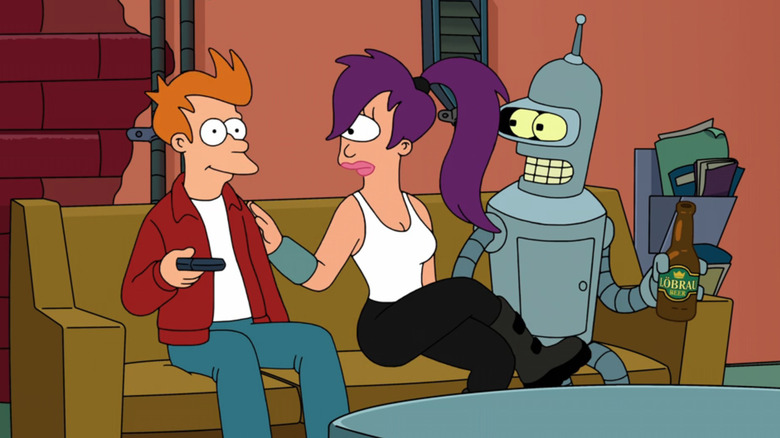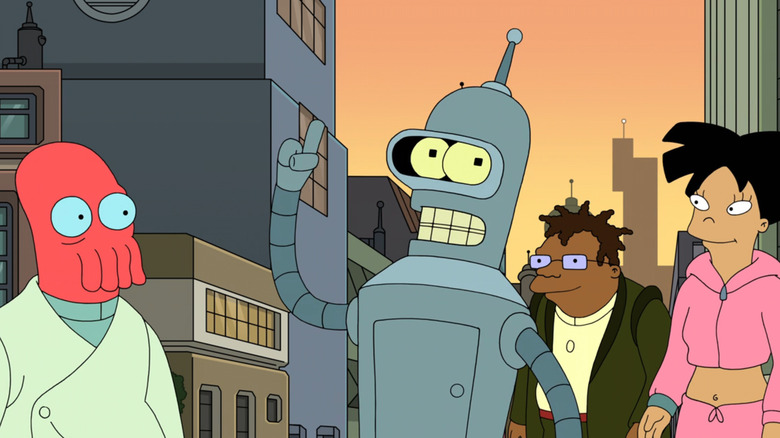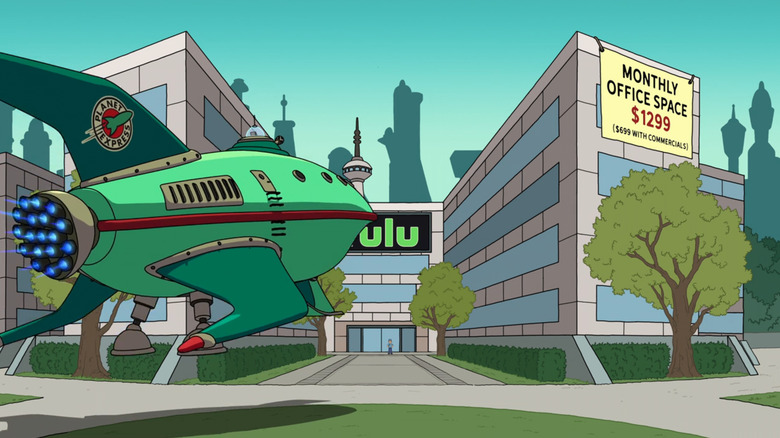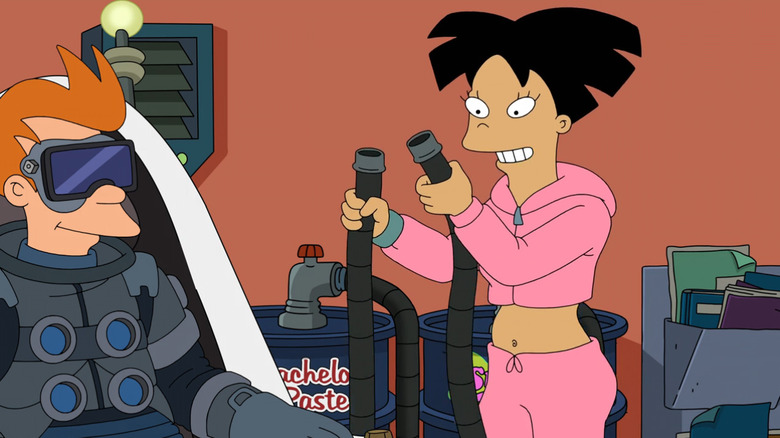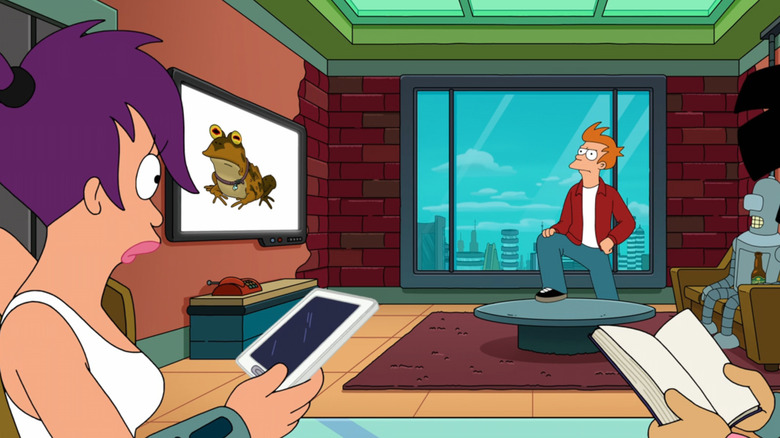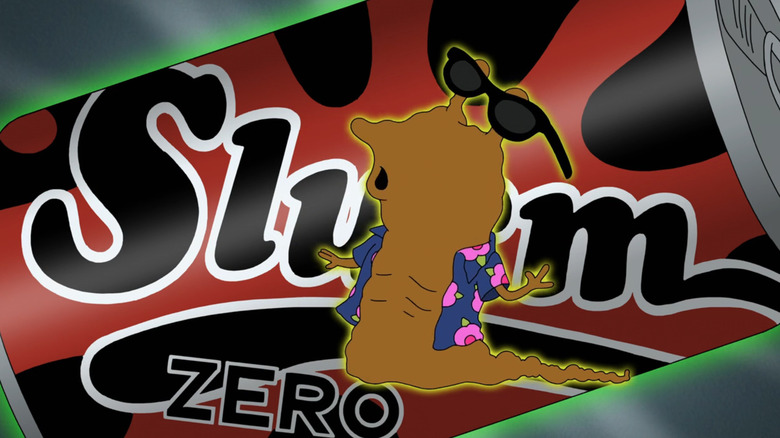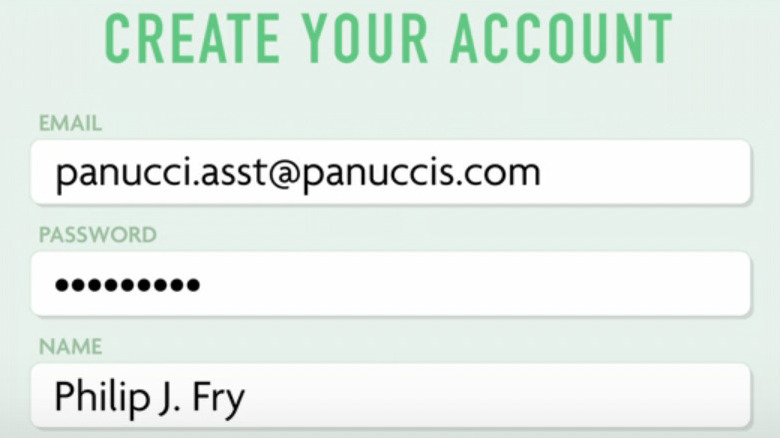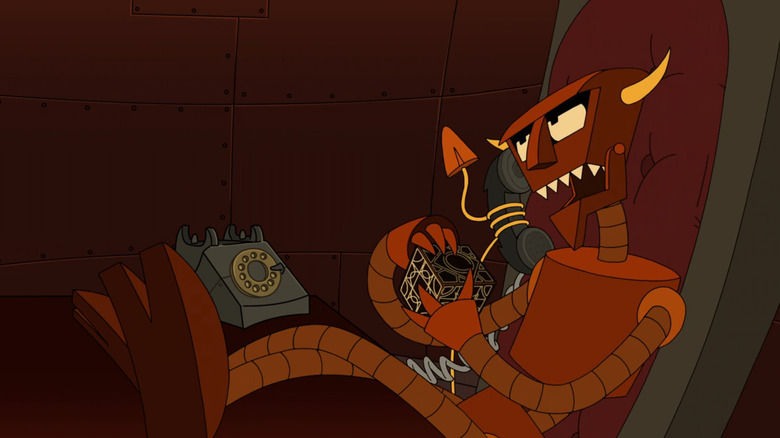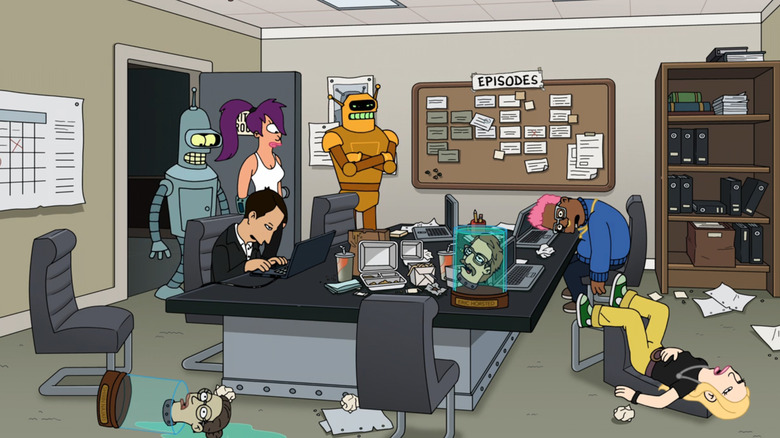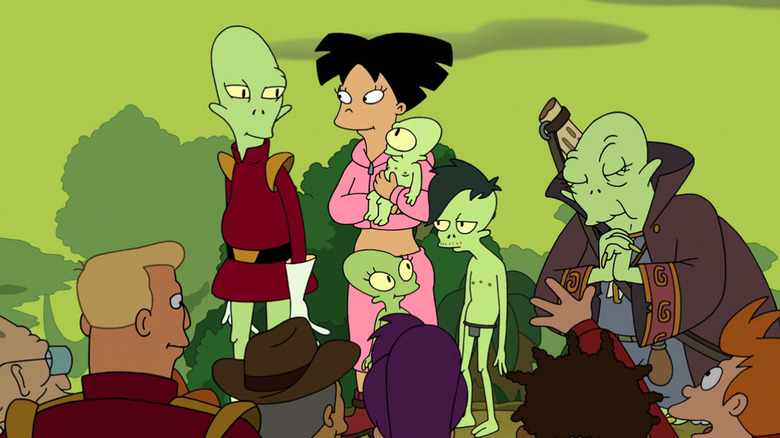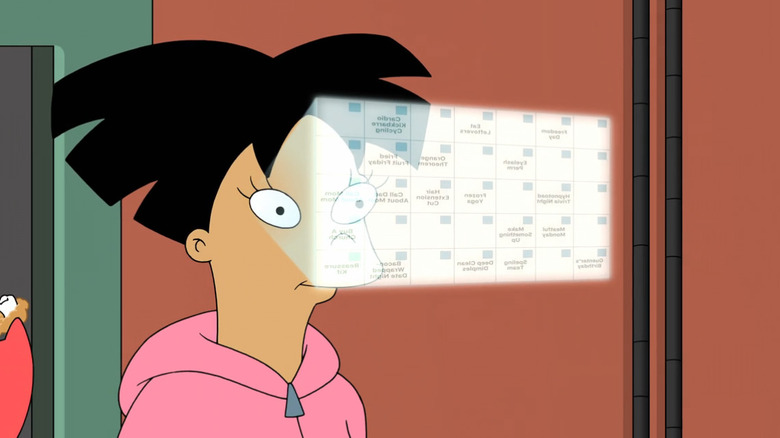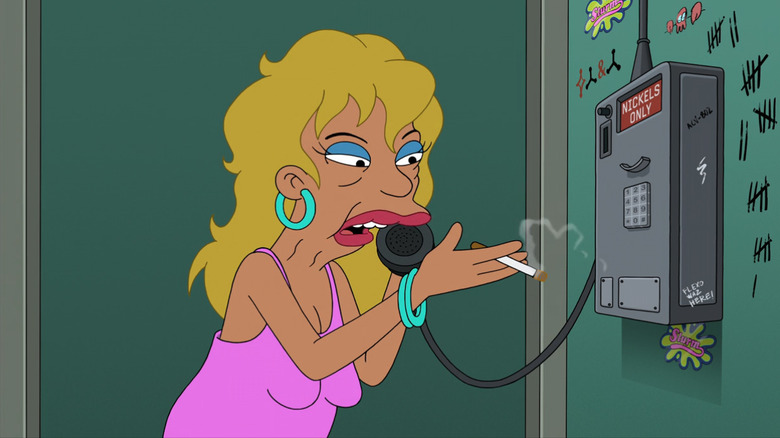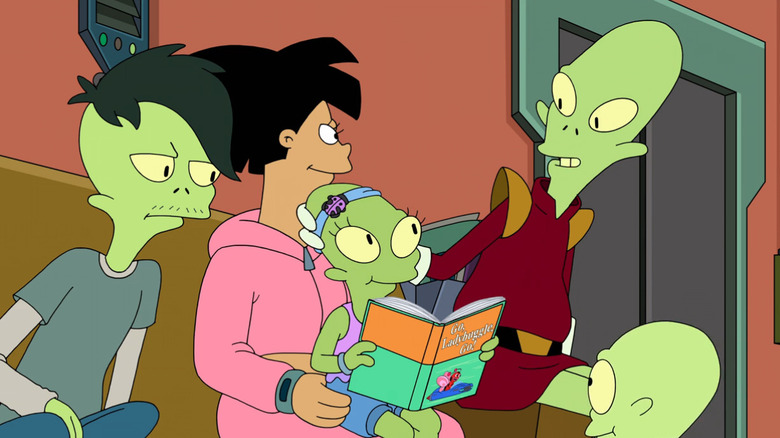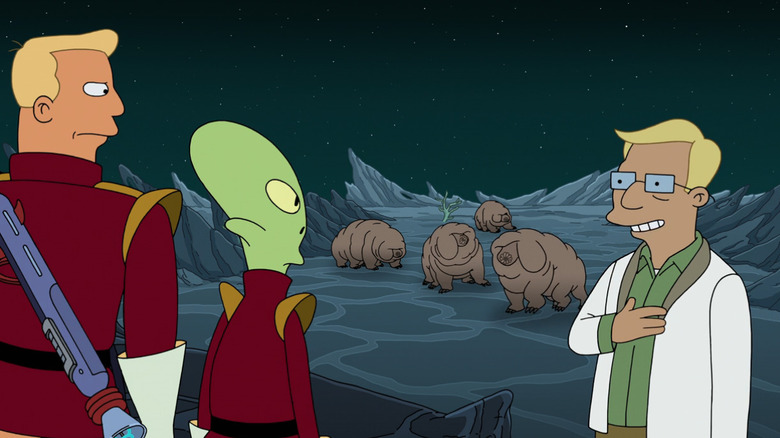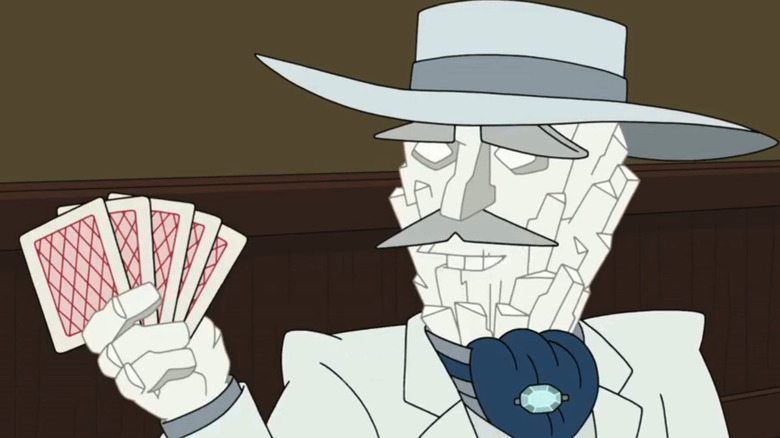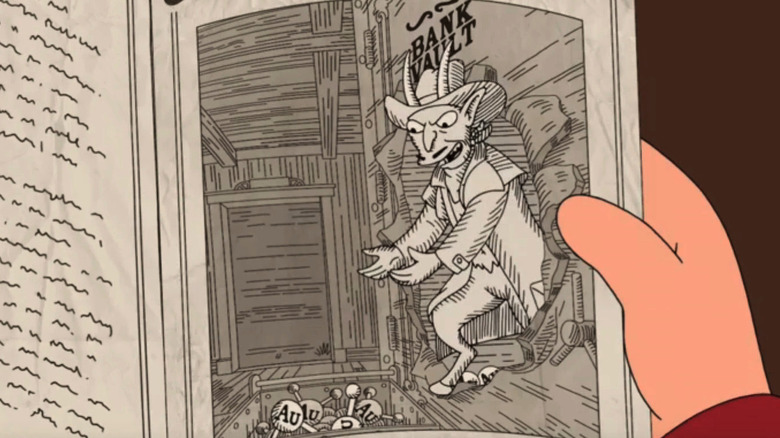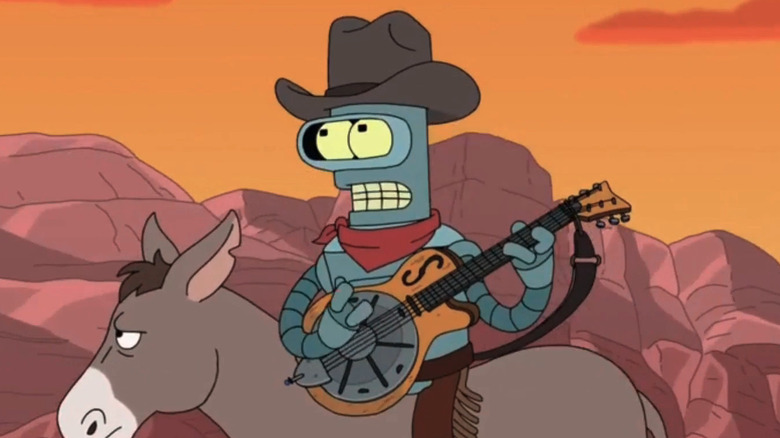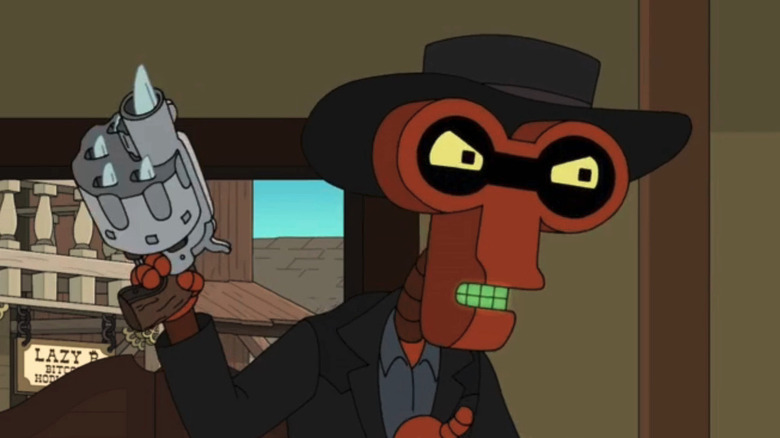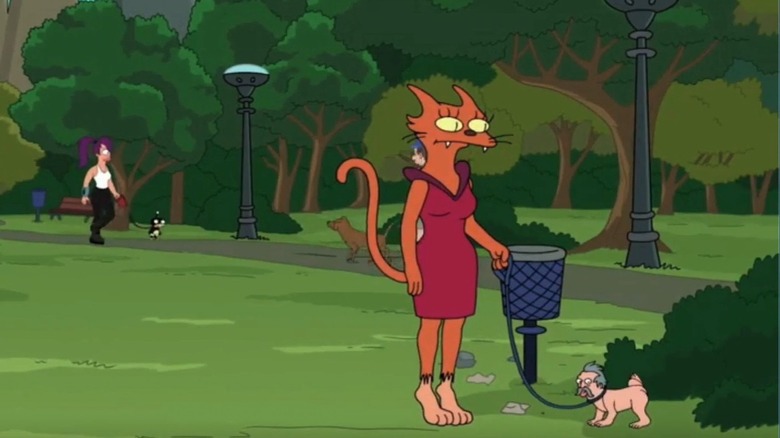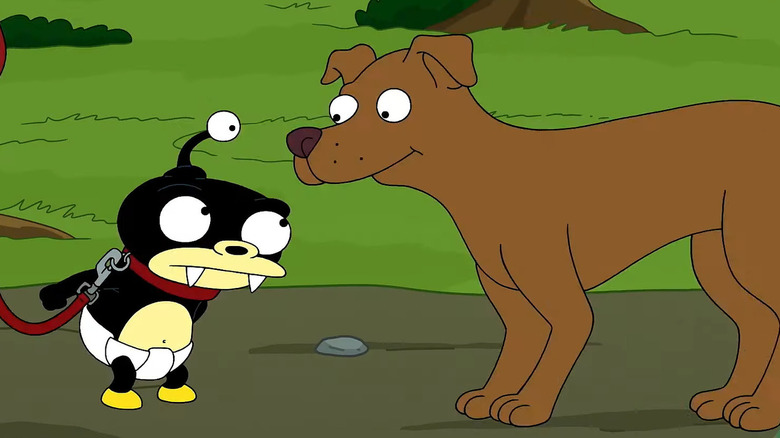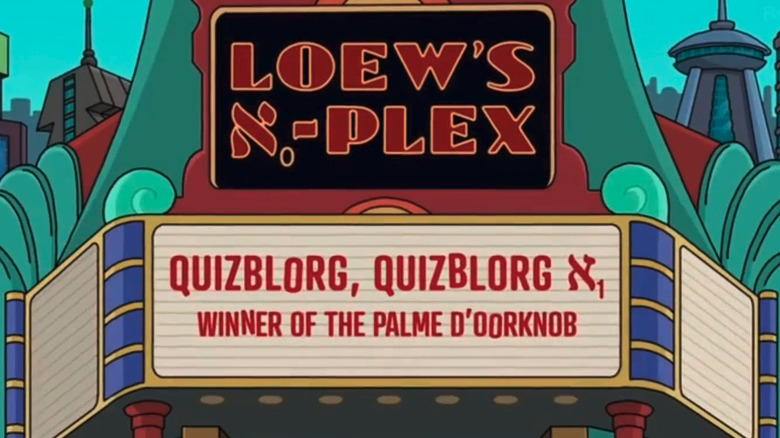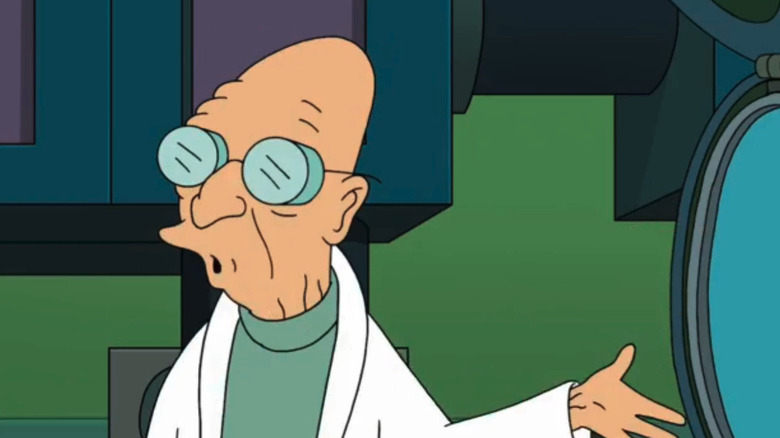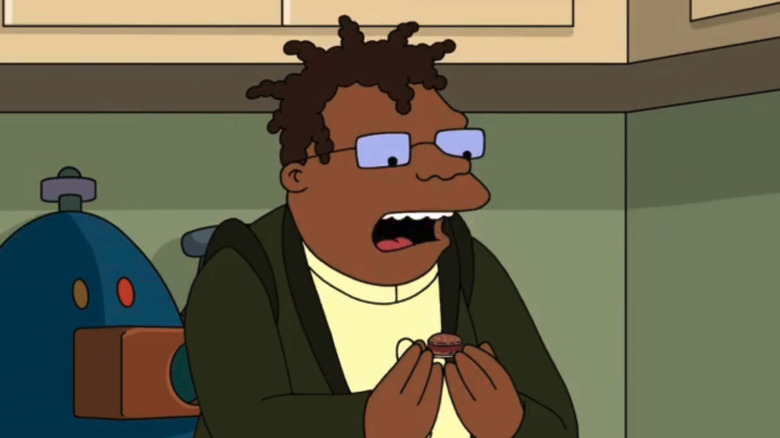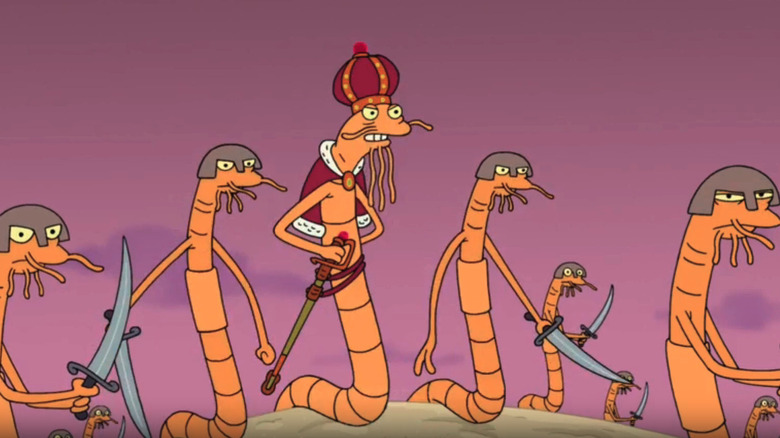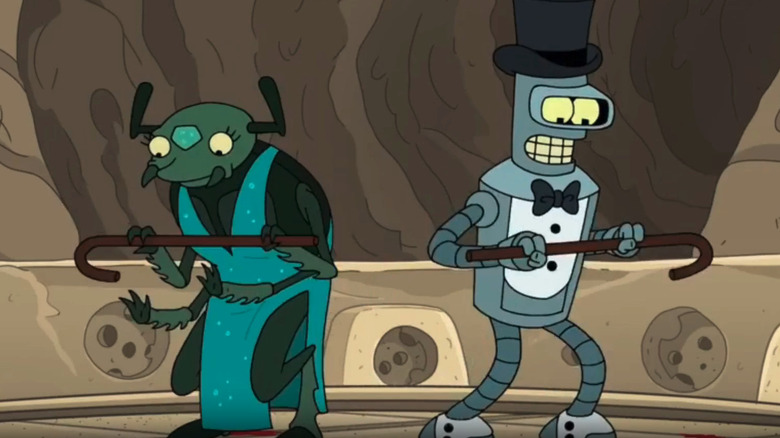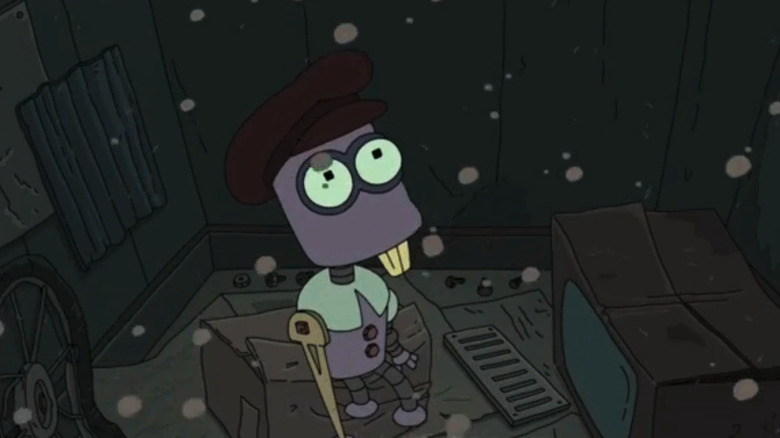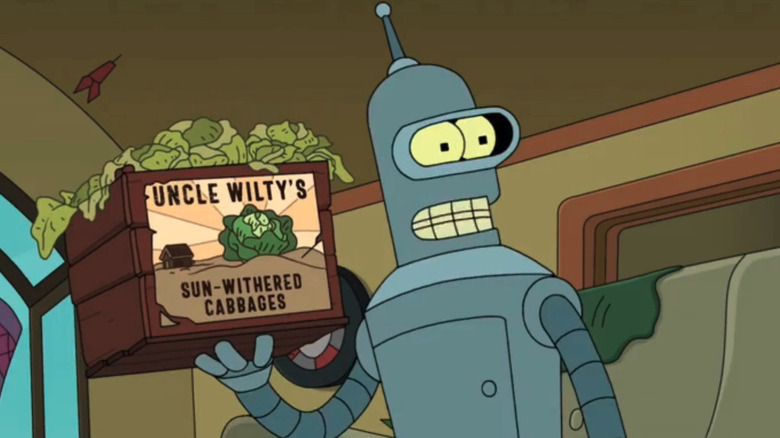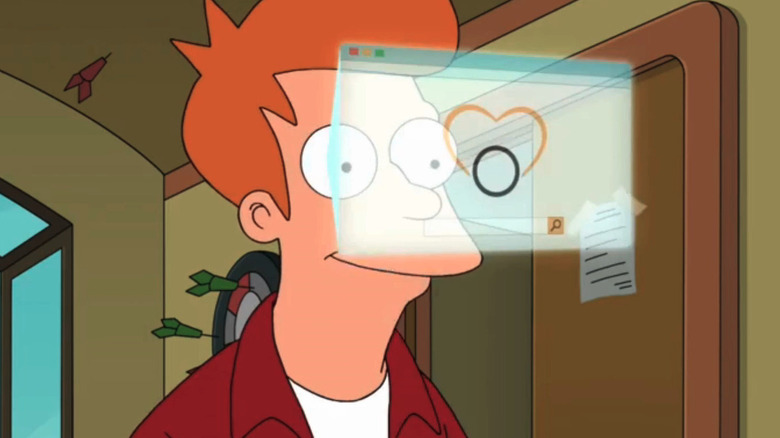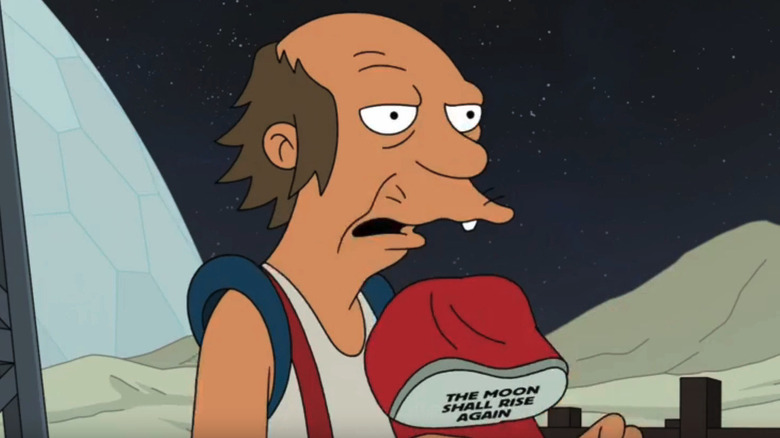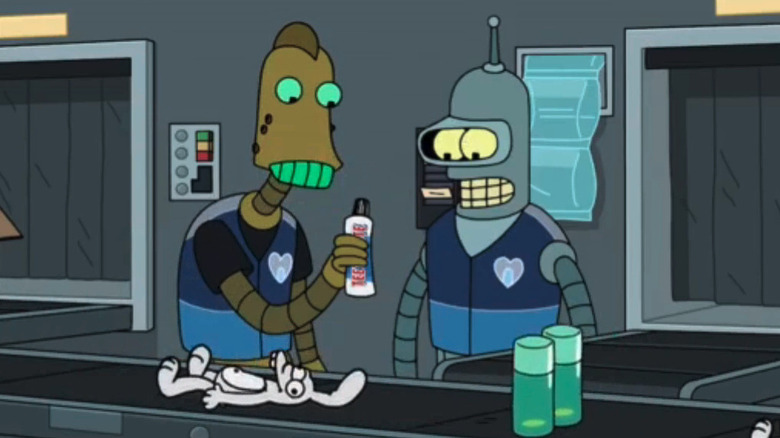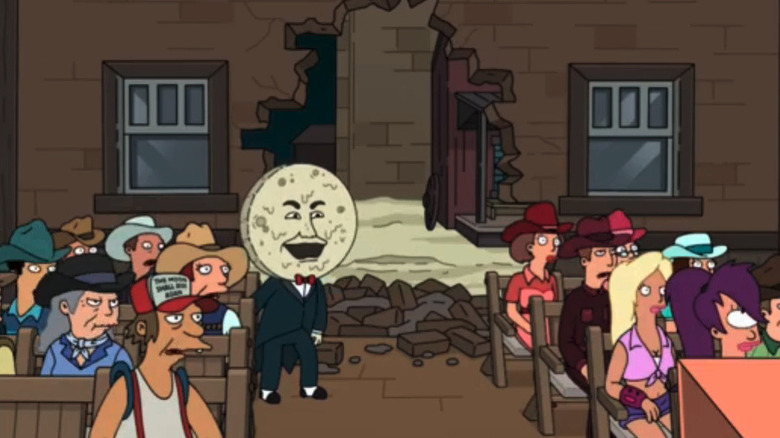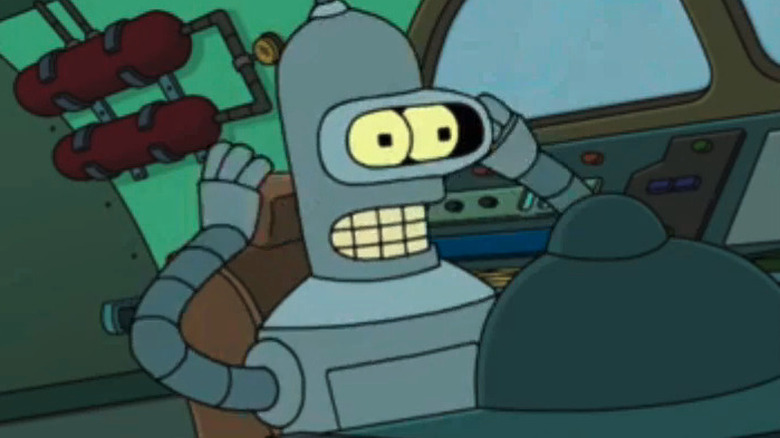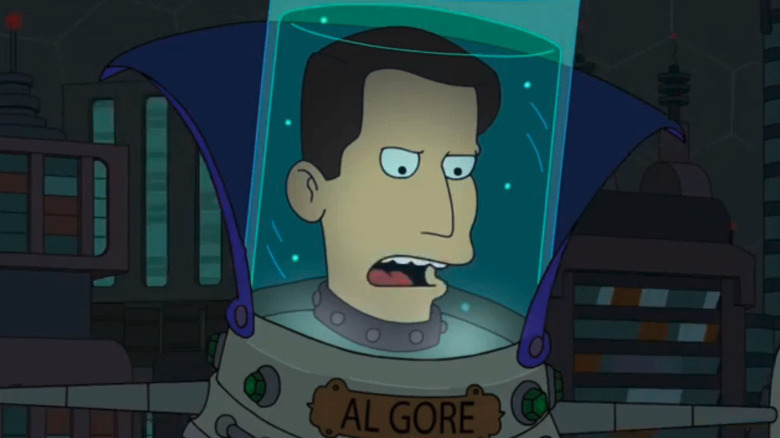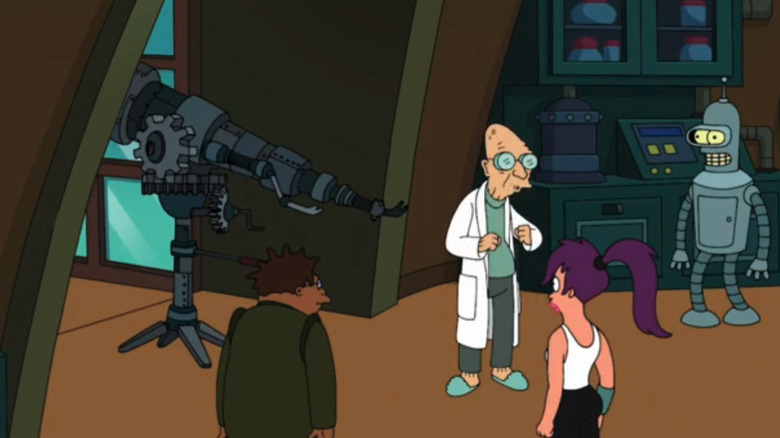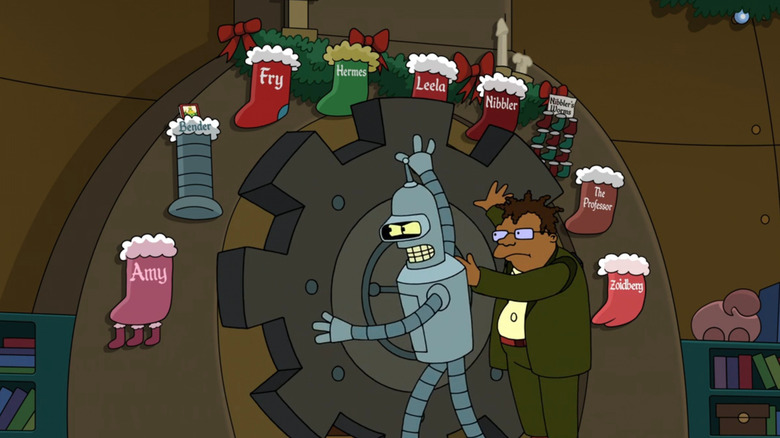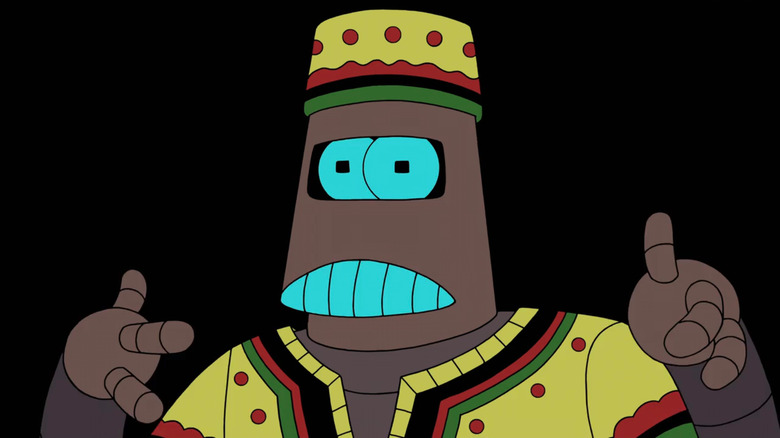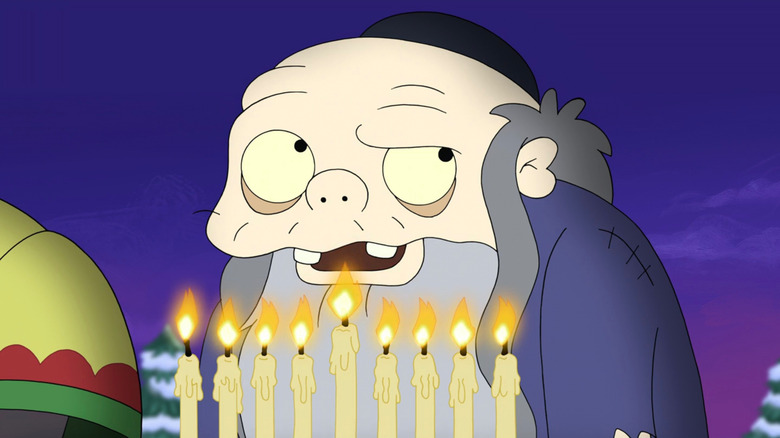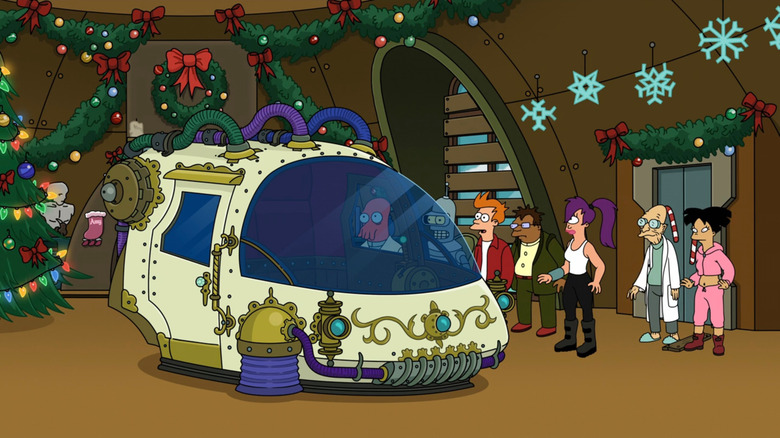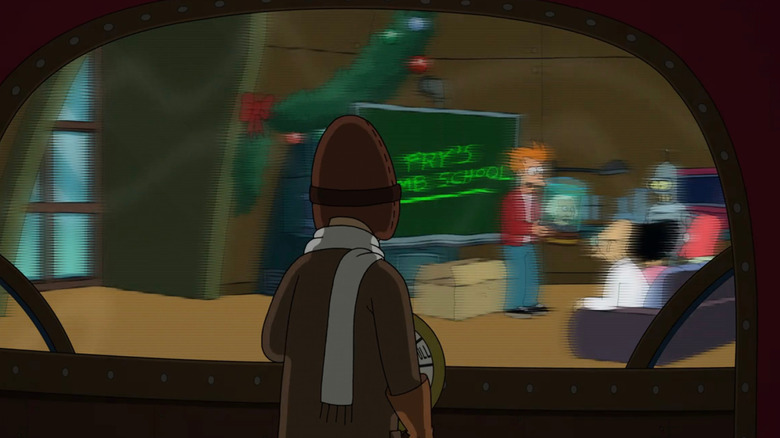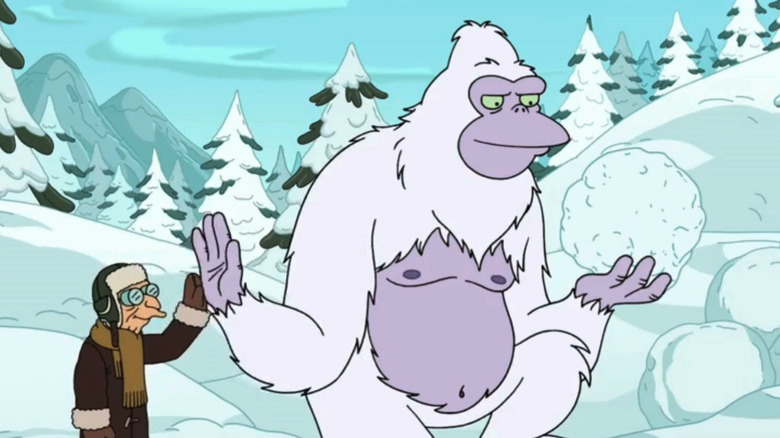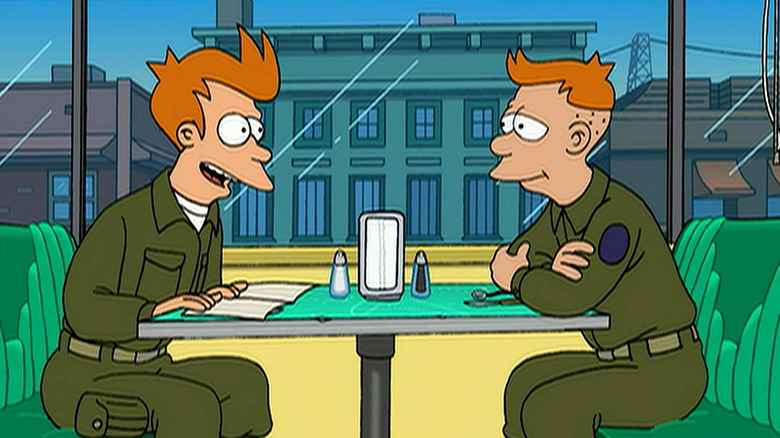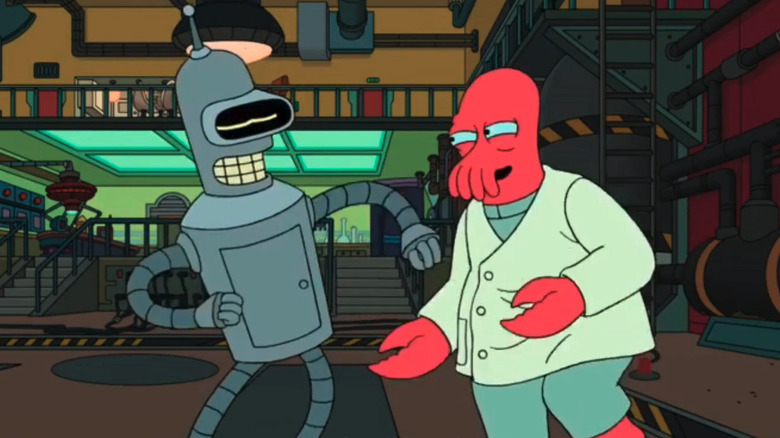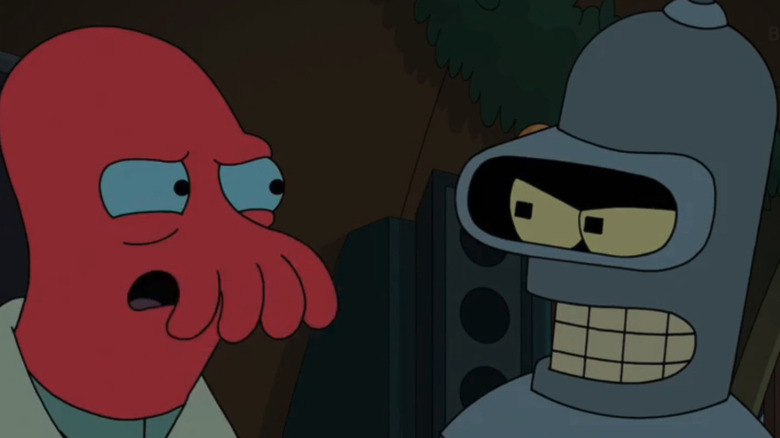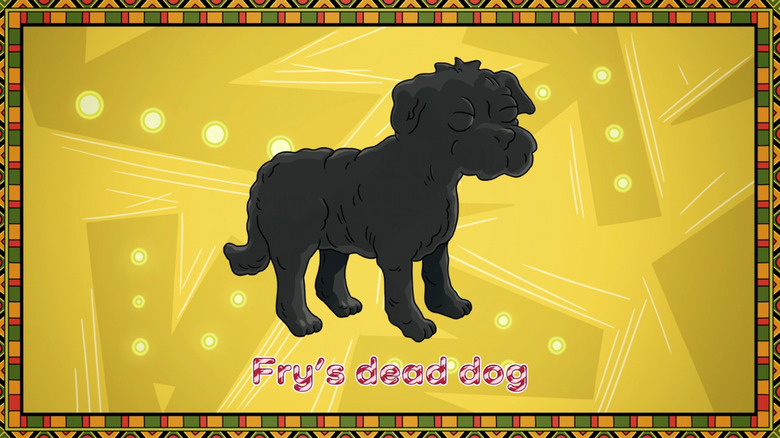Easter Eggs, References, And Gags That Return In Futurama Season 11
Today, "Futurama" is one of the longest-running animated series ever made — as long as you ignore all those years it was canceled and off the air, that is. First airing all the way back in the 20th century in 1999, it's spent 15 of the last 24 years not airing new episodes. However, the show has returned once again in 2023, this time on Hulu. Following a brief standoff with executives, the entire voice cast has returned to reprise their roles, with the Planet Express crew back in action once more for the first time since 2013.
In the show's revival, Hulu has resurrected one of the most beloved animated series of all time, and with it, a number of recurring gags, Easter eggs, and references to all-time favorite "Futurama" jokes. With all the new episodes, there are plenty of opportunities for deep cuts, meta jokes, and callbacks to some of the best "Futurama" episodes. So get ready for a trip through the InfoSphere, because we've found the best ones in "Futurama" Season 11.
Another rebirth brings parallels
"Futurama" Season 11 isn't the first time the show has returned from cancelation. Heck, it's not even the second, nor is it the first time it's switched networks. In 2008, after six years off the air, the Fox animated sci-fi show returned as a series of direct-to-DVD movies that were later split up to become a 16-episode season. Then, two years later, it came back again, airing new episodes on Comedy Central for a few years. Now, after more than a decade, it's back once more, this time on Hulu, and its premiere installment, "The Impossible Stream," pays homage to the Season 7 premiere, "Rebirth."
Like that 2010 episode, Season 11's first episode picks up exactly where the previous episode left off, down to the very second. Where "Rebirth" sees the crew of Planet Express crashing into New New York at the end of "Into the Wild Green Yonder," "The Impossible Stream" continues from the last moment of the Season 10 finale, "Meanwhile," with Professor Farnsworth rebooting the universe and essentially de-aging an elderly Fry and Leela.
Similar to "Rebirth," the Season 11 opener also includes a prominent plot point that sees Fry and Leela dealing with what they believe is the death of the other. This time, it's Leela believing Fry has been blown up while attempting to binge-watch every TV series ever made, only to discover that he's alive and well.
Futurama continues an old tradition
One of the things that has always made "Futurama" co-creator Matt Groening so subversive is his willingness to make fun of the very networks that give him work. Between "The Simpsons" and "Futurama," he's mocked his own networks and the people who sign his paychecks on a nearly weekly basis for decades, and that habit hasn't stopped. Now airing on Hulu, "Futurama" wastes no time in bringing back its recurring gag of mocking the powers that be.
The very premise of "The Impossible Stream" allows for endless jokes at the expense of not just Hulu, but the idea of streaming television in general. From the sign outside the "Fulu" building taking a jab at ever-increasing subscription prices to the cancelation of popular shows that everyone loves, there's no shortage of jokes at the expense of the very network that airs the series. This once again mimics the Season 7 premiere "Rebirth," which had a lot of fun mocking Fox for canceling the show.
It doesn't end there, though, because "Futurama" also has a tradition of poking fun at itself. In "The Impossible Stream," it does so again, with fourth-wall-breaking gags about shows that have been canceled on multiple occasions.
Even the comatose need food and soda
Long before companies like Soylent and Huel were making full-meal replacement drinks, "Futurama" had its own variety of tasteless sludge that allowed anyone to get proper nutrition without the hassle of cooking. Appearing first in "I, Roommate," the third episode of the series all the way back in 1999, Bachelor Chow was the food of choice for Philip J. Fry after he moved into the Planet Express headquarters. Commercials for the chow also show up in the opening titles, and it pops up in a few other installments, but "The Impossible Stream" brings it back with a twist.
Vowing to watch every episode of every TV series ever produced, Fry is strapped into a full-body containment suit, complete with tubes that allow for air, waste removal, food, and drink. That food is provided by giant metal drums of Bachelor Paste, the successor to Bachelor Chow, which presumably pumps in all the nutrition he needs. Another drum also pumps gallons upon gallons of Slurm, the highly addictive soda pop of the future.
All hail the Hypnotoad
A long-running recurring joke in "Futurama" involves TV in the 31st century, and how it's little more than a way of brainwashing the masses. It's an old crank conspiracy theory in the real world, too, but "Futurama" takes it to literal levels in the Season 5 episode "Bender Should Not Be Allowed on TV" from 2003, where one of the hottest shows is "Everybody Loves Hypnotoad." The series stars an alien toad with pulsating eyes who's able to hypnotize even the most strong-willed humans and robots. The character's first appearance, though, came in "The Day the Earth Stood Stupid," where he's not even on TV, but a contestant in a pet show (à la the Westminster Kennel Club Dog Show), using his hypnotic powers to win the top prize.
In "The Impossible Stream," we see that "Everybody Loves Hynotoad" is still on the air, though his powers don't seem to be hypnotizing anyone anymore. Of course, eagle-eyed viewers with a pause button will also spot Hypnotoad among the TV shows that Bender scrolls through on a TV guide channel listing. On an apparent sports channel is a match titled "TCU Hypnotoads vs. Georgia Bulldogs." Though the Bulldogs — a real college team out of the University of Georgia — are pretty tough, we don't imagine they're much of a match for the TCU Hypnotoads (a play on the TCU Horned Frogs, a real-life club of Texas Christian University).
Plenty of old gags in new places
"Futurama" is famous for its bevy of background Easter eggs, and Season 11 wastes no time in assaulting fans with more than can be caught in a single viewing. Many of these gags come in the form of TV titles when Bender and Fry each scroll through a different menu of shows. There we get a load of references like the fake sci-fi classic "Star Trek: The Original Reboot" and a sports game featuring the Mets vs. Godzilla.
But it's not just original jabs and jokes, because there are plenty of titles that reference elements from the show's past. On top of the more easily visible "How I Met Your Smizmar" and "Slurmdog Millionaire," we also get "Melllvar Place," a parody of "Melrose Place" that pays homage to the alien cloud in the 2002 "Star Trek" themed episode "Where No Fan Has Gone Before." There's also "Disenpantment," a spoof of Matt Groening's more recent Netflix animated series "Disenchantment." Other titles that can be spotted are "The Marvelous Mrs. Poopenmeyer" (presumably centered on the wife of New New York's mayor, C. Randall Poopenmeyer), and "Mare of Neutropolis" — a parody of "Mare of Eastown" set in the capital city of the Neutral Planet from the episode "Brannigan Begin Again."
Pay close attention, and you may also spot an infomercial for "The Bowflexo" — named for Bender's doppelganger — and "Fonfon Ru Crashers," a satire of "Wedding Crashers" named for the word for "wife" in the language of Kif's amphibious alien race.
Whimmy wam wam wozzle!
"The Impossible Stream" breaks the fourth wall on a number of occasions, including with a fake-out fade-out ending. But it also features a fake commercial break, because, with its move to Hulu, it's the first time new episodes are airing without ads (assuming you have the service's ad-free subscription tier, of course). At around the halfway mark of the episode, we get a commercial for an in-universe product that fans know well — the soda pop Slurm, this time in a zero-calorie formula. And the brief ad includes a visit from an old friend.
As the can of Slurm Zero bursts onto the screen, it's followed by the brand's spokesman, Slurms MacKenzie. His first appearance came in the episode "Fry and the Slurm Factory," where Fry wins a chance to party with the soda's mascot. At the end of that episode, it's revealed that MacKenzie hates his job and is tired of partying constantly to promote the drink, and he sacrifices his life to allow Fry and Leela to escape the factory.
While Slurms' resurrection isn't explained in "The Impossible Stream," it's possible the company is using A.I. to bring him back from the dead to promote their product. Though if that's the case, we'd be forced to wonder why they're recreating him in a sickly, coughing form.
Signing on with his old job
In "The Impossible Stream," Fry's attempt to watch every TV show ever made begins when he signs up for the world's fourth-best streaming service, Fulu. While we don't have to point out what the fake service is spoofing, there's a callback to be found in Fry's sign-up screen when he opens his account on the site. His email address is a reference to his old job at Panucci's Pizza, the New York restaurant where he was a delivery boy all the way back in the series pilot, "Space Pilot 3000."
Over the years, "Futurama" has flashed back to the days when Fry worked there, and there's even an episode where time travel sends him back to his old job. In "A Fishful of Dollars," the robot creator and owner of MomCorp, Mom, re-creates Panucci's Pizza in an attempt to get Fry's banking details (spoilers: it works). The fact that Fry apparently still has an email address with the restaurant, which also suggests he was the assistant to Mr. Panucci himself, is something we never knew before.
The lamest configuration
Not every Easter egg is a reference or homage to an old episode of "Futurama," or even another series from co-creator Matt Groening. One that fans may have missed in "The Impossible Stream" comes when Leela sets out to produce new episodes of the robot soap opera "All My Circuits," trying to keep Fry alive after his life is put in jeopardy by his endless TV binge.
Since she needs the services of robot actor Calculon, the action shifts down to Robot Hell, where he'd been sent at the end of the Season 10 episode "Calculon 2.0." And our first glimpse of the computer netherworld is the throne of the Robot Devil, who cradles an iconic horror movie prop. Some audiences less familiar with classic horror movies of the 1980s might confuse it with a robot version of a Rubik's Cube, but the little box held by the Robot Devil is actually a puzzle box called the Lament Configuration, which is from the "Hellraiser" movies. In those films, solving the puzzle summons the demonic Cenobites, leading the solver to an eternity of torture not unlike what we see Calculon enduring.
Death in the writers' room
In "The Impossible Stream," Leela's attempt to produce infinite new episodes of "All My Circuits" breaks down when the writers can't crank out scripts fast enough. Bender, Leela, and Calculon barge into the writer's room to get to the bottom of things, only to discover the entire team of scribes dead or dying, including a pair of heads in jars in "Futurama" fashion. But a close look at the names on the head jars reveals a clever Easter egg.
A pause of the screen and some close scrutiny reveals the two writers' names as Shirin Najafi and Eric Horsted, two writers on Hulu's revival of "Futurama." While Najafi was a writer on this episode, Horsted was a writer and producer for more than 100 episodes of the series, including the 2023 revival. Though we can't say for certain, it's also likely that the other three writers in the room are based on more real-life "Futurama" writers.
Two decades on the dot
The Hulu "Futurama" revival decides to make use of the show's long layover to pick up a few dangling plot threads from earlier in its run. The second episode, "Children of a Lesser Bog," finally answers the question of what happened to Amy and Kiff's offspring in the episode "Kif Gets Knocked Up a Notch" from back in Season 5. But while the new story does a good job of getting viewers up to speed and reminding them of that older episode, what viewers may not realize right off the bat is how perfectly timed the episode really is.
That's because when "Kif Gets Knocked Up a Notch" was first aired, the newly married Kif announced that their spawn would re-emerge from the bog in 20 years. And sure enough, that episode aired in 2003, exactly 20 years before "Children of a Lesser Bog." Even as Amy stated back then, she is indeed ready to be a parent after two decades (despite not having aged a day).
Eye Phoney
When "Children of a Lesser Bog" begins, the Planet Express crew takes up a project re-creating one of Fry's favorite 20th-century candies. Unfortunately, it proves so sticky and disgusting that Amy finds herself in immediate need of a dental appointment. And she uses her eyePhone to pull up her calendar to schedule it, harkening back to a Season 7 episode, "Attack of the Killer App." The third episode of the show's first major revival in 2010 parodied the hype and excitement surrounding the release of the first iPhone, which was then still relatively recent.
The eyePhone, by contrast to Apple's real-life smartphone, is a tiny device inserted into the user's eye socket, which allows a virtual display to pop up in front of them when it's in use. It disappeared from the show after that episode, though, with "Children of a Lesser Bog" being its first appearance since. Of course, Amy's eyePhone calendar also includes a tidy Easter egg, with a date early in the month that marks the birthday of Guenter, the hyper-intelligent monkey from the Season 1 episode "Mars University," which aired in 1999.
Nobody likes Nutley
"Futurama" has its fair share of zany recurring side characters, and one of the wildest is Petunia, the cigarette-chomping gambler from across the Hudson River. She first shows up in the Valentine's Day episode "Put Your Head on My Shoulders" from 2000, when Bender recruits bus passengers from New Jersey to serve as potential partners for his holiday dating service. She reappears many more times throughout the series, but in "Children of a Lesser Bog," she namedrops her hometown, which we learned in that first installment.
In that episode, she mentions having to board a bus back to Nutley, New Jersey, a real-life town across the river from New York City. It's a little burg where very little happens, and nobody knows much about it, which makes it the perfect reference for "Futurama." Petunia shows up here after getting a gig babysitting Amy's kids, only to realize she's on the wrong planet. She then notes she'll have to wait for the "next generation ship to Nutley."
A rumbledy book
When Kif and Amy welcome their children, they bring them "home" to the Planet Express building, but it's not three babies. Instead, there's one teenage boy, one pre-teen girl, and a toddler. As such, they are all into different things, and the toddler in particular seems very interested in their "mother" Leela's own creations, the Humplings. Middle child Mandy is seen throughout the episode reading the book "Go, Ladybuggle, Go," a parody of the kid's book "Go, Dog, Go."
Ladybuggle, if you've forgotten, is one of the characters on "Rumbledy-Humps," a children's TV show created by Leela in the Season 8 episode "Yo Leela Leela" from 2011. In that episode, Leela becomes a bigshot TV show producer after writing a children's story for the kids at the Orphanarium that's adapted and becomes a hit TV show on the Tickleodeon Network. One of the characters on the series is Ladybuggle, and later on in the episode, one of the orphans can be seen reading the same book from "Children of a Lesser Bog" about the character, though he does wind up eating it.
A whale is as good as a bear
Part of "Children of a Lesser Bog" involves newly-minted father Kif leaving Amy alone with the kids to accompany Zapp Brannigan on a mission to a remote space outpost. There they discover an expedition led by a single biologist studying the moon's bears. Though he goes unnamed, this is the same character from the 2003 episode "Three Hundred Big Boys." We know this because, in this episode, he even makes mention of the time he was a Whale Biologist, studying a species he absolutely hated.
In his expedition, the Bear Biologist studies tardigrades, a reference to the colloquial nickname of the real microscopic creatures, "water bears." Of course, in this episode, they're the size of actual bears and capable of mauling humans. Considering the show's penchant for mocking (and paying homage to) the "Star Trek" franchise, this could very well be a tribute to "Star Trek: Discovery." In that series, a giant, bear-sized tardigrade is used to help power an experimental starship engine, before getting loose and murdering members of the crew.
The Borax Kid rides again
Season 11's second episode "How The West Was 1010001" takes the crew of Planet Express out west, where they hope to strike it rich by finding precious Thallium, an element that will help them build Bitcoin servers. Of course, in typical "Futurama" fashion, the West of the 31st century is a lot like the Wild West, complete with an old saloon, horses, and of course, some rough-riding, poker-playing, six-shooter-packing gunslingers. There, they meet The Borax Kid, the hero of Fry's favorite adventure novels.
Fans of "Futurama" will recognize him from a few earlier appearances, though this is the first time the mineral man plays a central role in the story. He showed up for the first time as a resident of Neutopia, in the episode of the same name and the Season 8 premiere from 2011. That episode saw a battle of the sexes that culminated with the crew swapping genders, and the Borax Kid appears at the end as a deus ex machina, using his magical powers to get everyone back to normal. He returns in Season 9's "Zapp Dingbat" where he's seen gambling at the Mos Def Cantina in another single-scene gag, and again for a pair of additional cameos in "Assie Comes Home" and "The Sun Also Rises."
"How The West Was 1010001" gives the Borax Kid the spotlight, where he's a tough-talking gambler who is at odds with Fry when it's discovered that his books are all rip-offs.
Maxwell's demon is a deep cut math joke
"Futurama" isn't just a show that pokes fun at sci-fi. It's also famous for its smart humor that requires some background knowledge to get a laugh. The drawback, though, is that sometimes that means there are jokes that will go right over the heads of the audience, who might scratch their heads — or worse, never even realize it's a joke. Such may be the case with a gag in "How The West Was 1010001," when Fry takes a peak inside one of the Borax Kid's pulpy adventure books, "The Borax Kid and the Outlaws of Thermodynamics." In it, the gun-slinging rock man tracks down a villain known as the Maxwell Demon.
In addition to some obvious jokes that see the demon stealing balls labeled "Au" (which is gold on the periodic table) and shooting bullets labeled "Pb" (lead), the villain himself is actually a reference to a real-life scientific thought experiment. Known as "Maxwell's demon," it was proposed by James Clerk Maxwell, a 19th-century physicist. In the hypothetical scenario, he posited a powerful entity (or "demon") with the ability to control subatomic particles of gas within separate chambers, and who could separate fast-moving particles from slow-moving ones through a series of doors. Doing so would decrease the total entropy within the closed system, in apparent violation of the second law of thermodynamics.
Bender is back in the saddle, playing the blues
Out searching for the mineral they plan to use to create Bitcoin servers, the Planet Express crew decide that the best way to find it is to use Bender's "shiny metal ass" to pan in the river. Despondent that he's without his beloved butt, Bender takes off on the back of Rusty, the trusted donkey he purchased in town, and proceeds to sing about his troubles. Dressed in a cowboy hat and red scarf, Bender rides Rusty through the mountains playing an acoustic guitar with a metal resonator — which just so happens to be the same one he was seen playing in the episode "Forty Percent Ledbelly" from Season 10.
In that episode, Bender declares that he wants to become a famous folk singer, and tries to procure Salmonella, the guitar belonging to folk legend Silicon Red. When he's rebuffed, though, he instead goes to Dr. Beeler, who uses advanced 3D printing to create an exact replica of the instrument. He names his new guitar Bender Mae ("because Bender 'Mae' be the greatest folk singer of all time") and with it, he does indeed become a famous folk artist. Unfortunately, he also finds himself on the wrong end of Big Caboose, a steel-driving blue-collar robot whose life story he steals for his new persona.
In "How The West Was 1010001," Bender's not singing folk songs with Bender Mae, but sad yodeling about losing his ass before accidentally breaking Rusty's back.
Roberto and his knives
"How The West Was 1010001" brings back the Borax Kid, who was seen in just a few older installments, but it also features one of the longest-tenured recurring robot characters, Roberto. First seen in the Season 2 episode "Mother's Day," Roberto is a deranged, criminal robot with serious homicidal tendencies. In the episode "Insane in the Mainframe," Bender becomes an unwitting accomplice in Roberto's spree of bank robberies, where he uses a knife, not a gun, as his weapon of choice.
Roberto's penchant for stabbing is referenced in "How The West Was 1010001," when he arrives in the saloon brandishing a revolver. Bender even points out how unusual it is to see his old pal Roberto using a gun instead of a knife, but that's when we see that rather than being loaded with bullets, the pistol is packed with six sharp and deadly knives. Roberto claims that "out here in the West" he needs a weapon that's "shooter." Later on, we also see him playing the traditional pinfinger game with the gun, shooting knives onto the table between his robotic fingers, a move thought to have its origins in the old West, where it's said to have been played by real cowboys, outlaws, and gamblers.
A cat and her human
"Parasites Regained" is all about Nibbler. It opens in New New York's Central Park, where Leela is taking her beloved three-eyed alien pet for a walk. As they stroll, we see other pet walkers in the park with their companions. Among them is someone fans of "Futurama" will probably recognize, though they're not exactly a regular — they only turned up a couple of times in the show's first 10 seasons.
The character in question is called Fluffers and she's a tabby cat who appears in the form of a woman. She's walking her human, a pint-sized pet whose name is Dave Spiegel. Spiegel has the appearance of an older man — complete with gray hair, a balding head, and a bushy mustache — but he walks on all fours like a cat or dog.
Fluffers and Spiegel made their first appearance in 1999's "I Second That Emotion," popping up in a waiting room at a veterinarian's office. They made a second appearance in 2001's "The Day The Earth Stood Stupid." In this episode, Fluffers enters Spiegel into the Sheep Herding Trials, and he comes in third. His prize is a party-sized keg of guinea pigs. It's no coincidence that both of these classic episodes are Nibbler-centric stories, just as "Parasites Regained" is.
Wait... since when can Nibbler talk?
When "Futurama" began its run, Nibbler was little more than an odd alien pet, one of many offbeat elements to signify that we were, in fact, a thousand years in the future. All that changed in the aforementioned "The Day the Earth Stood Stupid." In this episode, we learn that he's an ancient alien being who has been posing as a pet to get close to Fry, whose unique nature allowed him to resist the powers of the Brain Spawn. He became a walking, talking, powerful alien ally of the Planet Express Crew. But when that episode ended, he wiped everyone's memory.
In "The Why of Fry," Nibbler once again reveals he can talk to Fry, who is shocked, having no memory of their previous adventure. Once again, Nibbler wipes his memory, and the process repeats itself in "Bender's Big Score," where everyone is shocked to learn that Nibbler can talk. This time, he didn't wipe their memories, and so in "Parasites Regained," when Nibbler first speaks, Leela's surprise that he can talk is a humorous nod to all those previous episodes. It's a running joke about how he kept wiping their memories, and their repeated surprise whenever he'd reveal he was more than just a diaper-wearing house pet.
A classic Futurama film
In "Parasites Regained," Nibbler begins to lose his wits and get stupider, not unlike what happened to everyone but Fry in "The Day the Earth Stood Stupid." This time it happens slowly, and one of the first indications of his lowering intelligence is when he joins Leela at the movies. They attend a screening of a new alien language movie titled "Quizblorg, Quizblorg," and if that rings a bell, you really know your "Futurama." The film has been mentioned once before, in the episode "Raging Bender."
"Raging Bender" begins with most of the crew heading to the movies. While they ultimately choose to see "All My Circuits: The Movie," Leela considers a screening of "Quizblorg, Quizblorg." All we knew about it at the time was that it wasn't a historical documentary (Leela says she's not in the mood for one when Fry suggests "Galaxy Wars") and that she'd heard good things about it.
In "Parasites Regained," we learn that the Palme D'oorknob-winning film "Quizblorg, Quizblorg" is actually a black-and-white movie featuring a "Citizen Kane"-like squawking alien entity. However, in what's seemingly a continuity error, Leela describes "Quizblorg, Quizblorg" as a new movie this time around, despite having heard about it years before. Of course, "Futurama" isn't exactly known for its strict adherence to continuity: Plenty of blatant plot holes have been pointed out over the years.
Professor Farnsworth's enlarging ray
"Parasites Regained" contains a plot hole that comes complete with a double Easter egg. Professor Farnsworth needs to shrink the Planet Express crew to battle the worms that have infested Nibbler through his litter box. In the episode "Parasites Lost" he created miniature robotic duplicates to go into Fry's body, but this time, he shrinks down the crew for real, using a device we've seen before: An enlarging ray, with some adjustments that reverse its biggify-ing effect. Where we've seen the enlarging ray itself, though, is where things get interesting.
The enlarging ray made its first appearance in the episode "Anthology of Interest," an episode that told three imaginary stories. They're concocted using Farnsworth's "What-If Machine," which responds to questions posed by the crew, including one asked by Bender about what it would be like if he was 100 feet tall. In that tale, Farnsworth uses the enlarging ray to super-size Bender, who wreaks havoc on the city in a parody of the movie "The Iron Giant."
But if the enlarging ray was only in an imaginary episode, how did it show up here? Well, that's where the double Easter egg comes in, because when Farnsworth asks, "Remember my enlarging ray?" the crew responds with an emphatic "no." This is a clear nod to the fact that the ray was only ever part of an imaginary adventure.
Hermes eats a tiny Manwich
Cartoon characters often have a favorite food. When it comes to Hermes Conrad, there's only one choice: The legendary Manwich. The real-life brand of sloppy joe sauce is also often what people call the sandwich itself, and it is Hermes' favorite. The running gag on "Futurama" is that something awful always seems to happen to his Manwich, prompting him to cry out, "My Manwich!" It's been snagged by a fishing reel, eaten by Bender, and found inside Professor Farnsworth. Season 11 brings this gag back (with a tiny twist) in "Parasites Regained."
When Professor Farnsworth uses his new shrinking ray, he has to fire it blindly at the tank that Fry, Leela, Bender, and Zoidberg are driving as it races down a giant-sized toy track. While trying to zap the tank, he misfires several times, and one strike hits the microwave containing Hermes' Manwich. Hermes pulls it from the microwave and cries out with despair, "My tiny Manwich!" He's left with less than a mouthful of Manwich, but we're betting Hermes still enjoyed it.
The royal worm is back for another bout
If you haven't figured it out by now, "Parasites Regained" is a quasi-sequel to 2001's "Parasites Lost." That episode, which originally aired more than two decades ago, is a send-up of the classic novel "Flowers for Algernon." It sees Fry inexplicably become smarter and more sensitive, and thus more attractive to Leela. The reason for the change is traced to tiny parasites that have begun living in his brain, and in "Parasites Regained," that same army of parasites comes back. It's not just the same species, but apparently the exact same ones, including their sword-wielding, crown-wearing king.
Though it's not said specifically, "Parasites Regained" seems to imply that after the worms left Fry's body at the end of the "Parasites Lost," they moved over to infest Nibbler and his litter box. It turns out that the parasites aren't making Nibbler any smarter because they too are infested with their own parasitic creatures. As a result, their intelligence-boosting powers are actually having the reverse effect. Rather than battle the worm-like parasites this time around, Fry and the Planet Express crew must eliminate the even tinier parasites, which appear as crab-like critters, much to Zoidberg's dismay.
Bender shows off his old tap-dancing skills
When the Planet Express crew discovers that the parasites have parasites in "Parasites Regained," they decide to eliminate the tiny menaces. To that end, Bender straps on a tuxedo, grabs a cane and a top hat, and begins tap-dancing, crushing the little crab-like parasites with each step. As you watch them go crunch beneath his feet, you may be reminded that this isn't a new talent of Bender's trotted out just for this episode. Bender's toe-tapping abilities were first seen in the episode "Stench and Stenchibility," and its reference here is a clever deep cut.
An episode from 2013, "Stench and Stenchibility" mostly focuses on Zoidberg. He meets a woman who is perfect for him — because she has no sense of smell. Meanwhile, in the episode's B-story, Bender learns that he has a hidden love of tap dancing. He only realizes it after he discovers some tiny bugs all over him, and begins tap-dancing to crush them. From there, he enters a tap dancing competition, where he must go up against a little girl with a heart condition. Clearly, tap dancing is his go-to defense when bugs and parasites are involved.
Tin Tim and his plucky attitude
When "Futurama" Season 11 was announced, some wondered if the show would break up Fry and Leela, who finally got together officially at the end of the previous season. However, in the Season 11 episode "Related to Items You've Viewed," their relationship actually takes a big step forward, with Fry and Leela moving in together. Specifically, Leela comes to live in Robot Arms, in the apartment Fry and Bender share. Before she moves in, though, the slovenly pair clean the place up, and that's when we get a cameo from an old robot friend.
His name is Tin Tim, a send-up of Tiny Tim from "A Christmas Carol." We first met him in the 1999 episode "Xmas Story" as a down-on-his-luck orphaned robot who is nevertheless always optimistic no matter how bad things get. He played a key role in several later episodes, including one where he helps Bender's activities with the Robot Mafia. Here we learn that he actually lives under the floorboards of Bender and Fry's apartment (not so surprising since most robots live in tiny, confined spaces in this universe). He also seems thrilled to have all the dust and dirt from their living room swept into his little hidey-hole, describing it as being like the snow in London.
Bender's cabbage is an ongoing joke
While Fry is eager to get the apartment clean for Leela's arrival in "Related to Items You've Viewed," Bender isn't quite so thrilled. Instead of lending a helping robot hand, Bender decides he'd rather be having some messy fun — he pulls out a box of Old Man Wilty's Sun-Withered Cabbages for a good old fashioned food fight. But this is no random crate of cabbage Bender has, it's actually the punchline of an old joke, going back to the 2008 "Futurama" movie "The Beast with a Billion Backs."
In that story, Bender is feeling neglected because Fry is going on a date with a woman named Colleen, so he tries to convince him to stay in and watch movies. To seal the deal, he produces a cabbage, telling him, "I brought you a cabbage to snack on. Humans like cabbages, right?" Fry isn't convinced and leaves for his date, after which Bender uses the cabbage as a head for a makeshift Fry replacement. In "Related to Items You've Viewed," Bender tries to use the cabbages to distract Fry from his girlfriend's imminent arrival, this time Leela. Why Bender thinks humans love cabbage is anyone's guess.
Not the first Amazon joke
"Related to Items You've Viewed" is an episode all about the corporate villain Mom. Founder of Mom's Friendly Robot Company, Mom operates one of the most powerful corporations in the world of "Futurama." In this episode, we learn that she's started a new division called Momazon, hence the episode's title — the phrase is used by online giant Amazon to help customers locate new items. Like its real-world counterpart, Momazon is an online "everything" store that can ship things faster than seemingly possible, threatening to shut down the Planet Express delivery business for good.
This isn't actually the first time that "Futurama" has taken a jab at Amazon. While the joke here is that the business is so big and successful that it ultimately consumes the universe, the gag was quite the opposite last time around. In an ironic twist, the first joke at Amazon's expense came in the episode "Three Hundred Big Boys," in which the government gives everyone a $300 check. Hermes' son Dwight decides to use his payment to make a stock market investment, and his choice is Amazon.com. When this episode aired in 2003, Amazon wasn't the powerhouse it is today, so Hermes reacts to this decision by praising his son for embracing a risky investment.
The moon farmer rises again
Set a thousand years in the future, the world of "Futurama" is very different from what we know. We learned in the show's second episode, "The Series Has Landed," that those differences extend to the moon, where the Planet Express often makes deliveries. There on the lunar surface is a children's amusement park as well as a hydroponic farm run by a crass man and his robot daughters. In that early episode, Bender falls in love with one of the daughters, a brute of a bot called the Crushinator, who stands out against her more delicate sisters.
Over the course of the series, the hydroponic moon farmer (who has yet to actually receive a name) has popped up a few more times, mostly in background gags. He can be seen in a crowd of evolution protesters in "A Clockwork Origin," and he's in attendance at the big event in "Space Demolition Derby." In "Related to Items You've Viewed," he gets some dialogue, showing up when the Planet Express crew goes to the moon to deliver a shipment of Uncle Wilty's Sun-Ripe Manure. It seems that he's just as miffed about Momazon being there as they are.
Familiar faces at Momazon
"Related to Items You've Viewed" doesn't just talk about Mom's new online store, it goes inside it, too. Much like her larger business of MomCorp, Mom uses robot laborers as her work force, and Bender decides to defect from Planet Express to take a full time job in a Momazon warehouse. When we get a glimpse inside the warehouse we see that the staff is a who's who of recurring robot characters from "Futurama" history.
Bender's former love Crushinator is there, and so is Hedonism Bot, the Roman-reclining robot with a highfalutin attitude, shown here packing boxes for Momazon. There's also Refreshment Bot, a robot who resembles a pimply-faced teen, last seen in "The Silence of the Clamps." And it's not just robots, either. In a blink-and-you'll-miss-it cameo, we also see Bongo, the one-eared rabbit hero of "Futurama" creator Matt Groening's 1980s comic strip "Life in Hell." This isn't his first "Futurama" cameo: Bongo's background appearances have become something of an ongoing joke in the show.
Craterface back in action
When Momazon gets too big and begins causing problems with its massive warehouse on the moon, lunar residents join forces to try and stop its expansion. At a "town meeting" of sorts they confront Mom herself. Among the people angry with Momazon is an old face from "Futurama" past, the moon man known lovingly as Craterface. Partly an homage to the classic silent film "A Trip to the Moon," Craterface has the body of an ordinary man but a huge head that resembles the moon itself.
Like many other cameos in "Related to Items You've Viewed," Craterface made his first appearance back in the episode "The Series Has Landed." He was introduced as the mascot for Luna Park, the theme park located on the moon. In Season 11's "Related to Items You've Viewed," Craterface gets angry with Mom when she says that she just wants to be a part of the lunar community. He angrily snaps back at her with a raised fist, telling her to "go to hell" and be a part of that community.
We're doomed!
There are lots of catchphrases in "Futurama," from Professor Farnsworth's "Good news, everyone!" to Morbo's "I will destroy you!" But if the show has a king of catchphrases it has to be Bender, who has distinguished himself with such classics as "Bite my shiny metal a**!" The episode "Related to Items You've Viewed" brings back another classic Bender catchphrase, and it's one we haven't heard in a while: "We're doomed!"
Bender is actually more known for saying "We're boned," but on a couple of memorable occasions, he has substituted in "doomed." The first time was actually in response to the rest of the Planet Express crew, who each said that they were doomed before Bender followed with a long, bellowed version of the phrase. That's in the episode "The Problem with Popplers," when Lrrr (of the planet Omicron Persei 8) arrives with an invading army to destroy mankind.
Bender repeated the catchphrase again years later in "The Farnsworth Parabox," but this time, he wasn't alone. On this occasion, he's joined by a golden version of himself from a parallel reality. They shout "We're doomed" when they realize that Hermes may be about to throw their universe into the sun.
Al Gore is back
Since the very beginning, "Futurama" has featured cameos from famous faces playing themselves, usually as a head in a jar. They've welcomed everyone from musicians like the Beastie Boys and Beck to sports stars like Hank Aaron and Larry Bird. There have been plenty of actors, too: Most of the original "Star Trek" cast have popped up in jars over the years. One of the few famous people to become something of a recurring character is former vice president Al Gore, who first guest-starred in the episode "Anthology of Interest."
Gore would return to voice himself in "Crimes of the Hot," an episode about global warming, and two of the four "Futurama" movies. Typically, Gore shows up to give some kind of important lesson about the dangers of climate change, in the same vein as his 2006 book "An Inconvenient Truth." In "Related to Items You've Viewed," Gore returns once more to voice his own head in a jar, marking his first time on the series since 2010's "The Futurama Holiday Spectacular." He shows up to rub it in the faces of the Planet Express crew that he was right about the planet crisis after the Momazon warehouse grows so large it blots out the sun.
Farnsworth's Smell-O-Scope to the rescue
Professor Farnsworth has come up with countless inventions over the years, but few are quite as memorable as the Smell-O-Scope. It was used for the first time in "A Big Piece of Garbage" as a way of locating an asteroid-sized garbage ball that's headed to Earth, threatening to destroy all of mankind with it. That isn't the only time it's turned up, though. The Smell-O-Scope is used in "A Clone of My Own" to locate the professor himself when he gets taken away to the Near Death Star, and it's also used in "Time Keeps on Slippin" to track down supposed "time leaks" in a distant nebula.
Prior to Season 11, the Smell-O-Scope was last seen in "The Beast with a Billion Backs" (not counting the miniature version that popped up in "The Butterjunk Effect"). In "Related to Items You've Viewed," Farnsworth digs out the full-sized Smell-O-Scope to track the expansion of the Momazon warehouse. He learns from its smells that it has actually grown to encompass the entire universe. It's a device that's proved very handy at several points in the series, and it's vital once again here.
Stockings for worms
"Futurama" has a tradition of holiday episodes, and the show's return on Hulu brings that back with the episode "I Know What You Did Next Xmas." The episode opens on Christmas Eve, when everyone is getting ready for the annual visit from the Evil Robot Santa Claus. They're barricading the doors, putting up defensive armaments, and preparing for an all-out assault, as is the annual procedure. But while everyone is getting ready, you might notice the stockings for the crew of Planet Express hanging above the fireplace — and if you look closely, there's even one for a microscopic member of the family.
Hanging between Nibbler's stocking and Dr. Zoidberg's is a series of several tinier stockings labeled "Nibbler's Worms." A reference to the parasitic creatures that live inside Nibbler's litter box seen two episodes earlier, it's a nice bit of continuity. We're not sure what they could have gotten the little critters who are too small to see with the naked eye, but it goes to show that they're here to stay.
A farewell fit for Coolio
The second "Futurama" Christmas episode, "A Tale of Two Santas," aired in 2001, and it saw the first appearance of another religious robot: the Kwanzaa Bot. In that episode, he was voiced by rapper Coolio, and he returned nearly a decade later to voice the character again in the 2010 episode "The Futurama Holiday Spectacular." He's popped up in a few other places, mostly in background cameos with no dialogue, but now, in "I Know What You Did Next Xmas," he's back for a bigger role.
For the third time, it's Coolio providing the voice for Kwanzaa Bot, which is a special treat for fans of the rapper, and an unintentionally poignant moment for the series. It was almost a full year before the episode aired when, in September 2022, Coolio passed away, but it seems he was able to record the role before his death. In what will be the final time he plays the role, Coolio brings Kwanzaa Bot to life once more, appearing as part of a Christmas special Fry, Amy, Kif, and their kids are watching on TV.
But the real treat comes at the end of the episode when during the credits, Coolio raps a "Futurama" version of the "12 Days of Christmas" as Kwanzaa Bot. The episode closes out with a dedication to Coolio's memory, with a title card over an image of his character floating off into the sunset in a boat above the Earth.
Chanukah Zombie resurrected
Like Kwanzaa Bot, there's another religious mascot that inhabits the wacky world of "Futurama" around the holidays. His name is Chanukah Zombie, and he represents the Jewish side of the holiday equation, appearing as an old, cantankerous, bearded, yarmulke-wearing zombie. The character got his first mention in "A Tale of Two Santas" way back in 2001, but he didn't show up in person until years later, debuting on screen in the 2008 movie, "Bender's Big Score." There he was voiced by the legendary Mark Hamill, known for bringing to life such iconic animated characters as The Joker in "Batman: The Animated Series" and Skips in "The Regular Show."
Now in just his second appearance, Hamill returns in "I Know What You Did Next Xmas," appearing as Chanukah Zombie alongside Coolio as Kwanzaa Bot in the holiday special "There's a Holiday For Everyone." He and Kwanzaa Bot try to convince a group of local kids to let them tell their own stories, but they're stuck once again telling the tale of Robot Santa Claus.
Farnsworth's forward time machine
In "I Know What You Did Next Xmas," Professor Farnsworth decides he's finally had enough of Evil Robot Santa and sets out to end his reign of terror forever. To do it, he plans to go back in time to when Robot Santa first became evil and stop it from ever happening. And that means digging out his old Forwards Time Machine, which was first seen in the episode "The Late Philip J. Fry." That episode saw Farnsworth invent the machine that could only go forward in time, and get helplessly stuck when he accidentally travels too far into the future.
This time, though, Farnsworth has fixed the time machine to allow it to go backward in time too. Yet, he still only goes one way, going back in time so far that he passes the backward Big Bang. As we know from "The Late Philip J. Fry," the universe is one big cyclical birth, death, and rebirth, thus he winds up right back in the present, even though he never goes forward.
Days of future and past
When Professor Farnsworth first activates his time machine, he sets it to reverse and he disappears from view. But within the machine itself, he can see outside as time turns topsy-turvy and begins running backward. During this sequence, we get a montage of moments from past "Futurama" episodes. This includes a scene from the previous episode "Related to Items You've Viewed," as well as a glimpse of the classic episode "The Day the Earth Stood Stupid," where we see Fry teaching the rest of the crew in front of a chalkboard that reads 'Fry's Dumb School,' before a flash of the episode "Put Your Head on My Shoulders."
Later, when Farnsworth continues to go back in time, we see moments from even further in the past. We see society being destroyed and rebuilt multiple times over the course of millennia, a sight first seen in the show's pilot. Back past the Big Bang and into the future, we see more scenes from the far-off yonder years explored in "The Late Philip J. Fry," including the idyllic world full of willing women, and a highly-evolved, super-intelligent race of pint-sized people. Oddly enough, the montage also includes a clip of "Futurama" creator Matt Groening's more recent animated series, "Disenchantment," which aired for three seasons on Hulu rival Netflix.
Farnsworth is friends with a Yeti
It's Christmas without an Evil Robot Santa Claus for the first time in centuries in "I Know What You Did Next Xmas," which allows the Planet Express crew to enjoy the holiday with their families. It's a new experience for everyone, and so Fry joins his descendent Professor Farnsworth — and Farnsworth's child clone Cubert — in his cabin in the Bronx. There they have a snowball fight where Fry and Cubert are facing off against Farnsworth and a Yeti — a race of beasts we've seen before.
Yetis showed up first in "Bender's Big Score" when the crew of Planet Express travels to Neptune. Yeti makes a return in the 2011 episode "The Tip of the Zoidberg," which reveals the secret origin of Professor Farnsworth and Dr. Zoidberg's friendship. As it turns out, they were both part of a special mission for Mom's bioweapons division, sent to Neptune's moon Triton to kill and retrieve the body of a Tritonian Yeti. During the mission, Farnsworth contracts hypermalaria, a disease that lays dormant for years before turning fatal. Later, though, it's discovered that it's not hypermalaria at all, but Yetism, turning Farnsworth into a monster himself. How or why Farnsworth is now friends with a Tritonian Yeti is anyone's guess.
Becoming your own grandfather
"I Know What You Did Next Xmas" certainly isn't the first time travel episode in "Futurama." After all, it brings back the Forwards Time Machine from "The Late Philip J. Fry." But when it comes to the best episode involving jaunts into the past, most fans would probably agree that the 2001 episode "Roswell That Ends Well" tops the list. And this new one makes a subtle nod to that installment when Professor Farnsworth is preparing to go back in time.
Gathered all together, the crew watches as Farnsworth suits up for the trip, and Amy warns him about the dangers of changing history. Farnsworth waves off the concern, saying he'll be going alone to avoid anyone becoming their own grandfather — which is exactly what happened in the 2001 episode. There, Fry went back to the 1940s, and in a misguided attempt to ensure his own existence, gets who he believes to be his grandfather killed. In the end, he winds up "doing the nasty in the pasty" with his own grandmother.
Do the Bender
In an earlier episode this season, Bender trotted out one of his favorite catchphrases, screaming "We're doomed!" But he's not done recycling his old favorites, and in "I Know What You Did Next Xmas" he brings out the big guns. After Farnsworth returns from his trip back in time, Bender and Zoidberg decide to use it to go back in time and kidnap Robot Santa to ruin Xmas. After they succeed — tying up the holiday bot in Christmas lights and locking him in the meat freezer – the pair celebrates, dancing while chanting "Do the Bender."
It's a dance and catchphrase fans of "Futurama" know well, seen in a number of episodes in the show's run. Bender famously did the Bender on the disco dance floor, and when one fellow club-goer didn't want to join in, he got in his face and demanded he do it. And Bender does it twice in "I Know What You Did Next Xmas," dancing with Zoidberg a second time at the end when they realize they've actually saved everyone from Evil Robot Santa's rampage. It's not the only jig he's known for, but maybe he'll do the "Bender is Great" dance in a future episode.
Zoidberg's inner McCoy
As a science fiction comedy, it makes sense that "Futurama" has long had an obsession with lampooning "Star Trek," a staple of the genre that's easy fodder for low-hanging jokes. There was even an entire episode, "Where No Fan Has Gone Before," that focused on the classic "Trek" series featuring the guest voices of William Shatner, Leonard Nimoy, George Takei, Nichelle Nichols, and Walter Koening. In "I Know What You Did Next Xmas," the show pokes fun at one of that franchise's most popular catchphrases, typically spouted by Dr. McCoy in the original "Star Trek" series.
Famously coined in the episode "Devil in the Dark," McCoy tells his captain "I'm a doctor, not a bricklayer." Here, it's the resident physician at Planet Express, Dr. Zoidberg, who says something similar when Bender gets angry at him for using the time machine incorrectly. Defending his misuse of the machine, he shouts "I'm a doctor, not a time machine guy!"
A painful reminder of things past
"Futurama" isn't just solid gold comedy. Many episodes are genuinely moving emotional stories, and when it comes to those poignant installments, none are more memorable than "Jurassic Bark," an episode so infamously upsetting to fans that many openly talk about how they skip it on rewatches of the show. At the center of the episode is the story of Seymour, Fry's dog in the 20th century, who is left all alone when he disappears. Sad and forlorn, Seymour waits hopelessly on the street for a friend who will never come, eventually dying on the sidewalk.
In the end, Seymour is discovered a thousand years later having become fossilized. That fossilized version of Fry's beloved canine pal makes a reappearance in "I Know What You Did Next Xmas," in the final musical number from Kwanzaa Bot. As a parody of the "12 Days of Christmas" carol, the song features the inclusion of "Fry's dead Dog" just before "two turtle-duckens." Intended as a humorous callback, the line may just leave some fans in tears.
